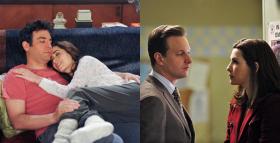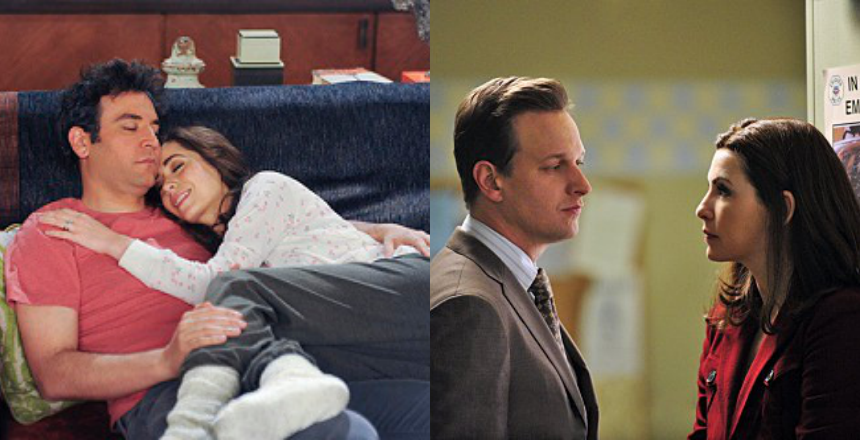WARNING: Intense spoilers follow for “How I Met Your Mother” and “The Good Wife”
Death on TV is complicated.
Often, we feel fictional loss as though it’s actually happening to us. But we also crave an entertaining story, full of conflict. Sometimes these two values clash against each other. The Creators of “How I Met Your Mother,” the twisty, turning, narrated sitcom about 20-somethings, then 30-somethings in New York City, did what many fans had desperately hoped they wouldn’t do in Monday’s hourlong series finale, entitled “Last Forever.” They finally showed Ted meeting “the mother”…then, boom! They killed her off.
Yes, mom (whose name was Tracy, by the way) was neatly dispatched to some unspoken illness several years into a happy relationship, thus giving “widower Ted” the chance to make it work with “divorcee Robin,” (his love interest from Season 1, now split from Barney) in the show’s final seconds.
It was a shocker of a tragic ending that ended up, of course, not being such a shocker at all, nor all that tragic. In an episode tinged with palpable nostalgia and sadness for leaving the silliness, drama, and relative simplicity of one’s twenties behind (as a 31-year-old I feel you, HIMYM, I feel you), the death of the mother was shown gently, beautifully, and sorrowfully – and passed by really damn quickly. A few weeks ago, the show hinted at (and audiences picked up on) the mother’s impending death. That was our opportunity to shake our fists at the screen, express disbelief and anger, and take it out on Twitter. In the finale, we flashed forward six years to see Ted’s kids totally well-adjusted and urging him, from their eternal seat on the couch, to “call Aunt Robin” for a date. We were offered little of the bitter struggle Ted must have had as a single dad of adolescents, no display of longing for the kids’ absent mom (who certainly seemed like his soul mate over the last several episodes), none of the anger, tears, and other messy elements of mourning the show offered us when Marshall lost his own dad.
The death part of the death was glossed over – which is part of why some fans feel cheated (nine seasons of waiting for the mother and she was dead all along? But that’s another article.) And yet, if they were going to kill her off, how they portrayed her demise makes sense: the creators didn’t want the finale to be more of a downer than it already was. With its divorces, drifting-apart friends, and Barney’s regression to jackass status, the manipulation factor, still high, would have been unbearable with a lingering, tear-inducing loss. Indeed, it felt painful to lose “the mother” just as we were getting fond of her. But she remained a new character, and Robin was Ted’s, and our, old flame, She of the Blue French Horn. Seeing them reunite after years of separation sweetened the bitter pill considerably.
Contrast that to another notable TV death reverberating off our screens this week. “The Good Wife,” a serial drama about scandal-plagued, ruthless Chicago lawyers and politicians, blew up fans’ expectations when it killed off main character Will Gardner, the on-again, off-again flame of protagonist Alicia Florrick.
This death came unexpectedly, not from the hand any of the sketchy minor characters that populate the show, but from a one-off character we’d almost forgotten about. Will was an emotional anchor of the series, and his loss was anything but gentle. It was examined in excruciating detail: an entire follow-up episode was devoted to the ensuing grief, in patterns than anyone who has experienced a sudden death will recognize. Everyone began in denial (“but I just saw him!”) Then Kalinda went to the morgue repeatedly, got sad and furious looking at Will’s body, and sought revenge. Cary and Diane took their anger out on misbehaving clients and interns. David Lee sobbed alone in his office, then found comfort in returning to selfishness. And, perhaps the most painful part of the show was watching Alicia, haunted and hollow, trace Will’s footsteps from his final day of life, questioning everyone who saw him, trying in vain to understand why he left her a voicemail, what he was going to say when he said, “hey, I’ll call you back.” She imagines both the best, and the worst things he meant, sick with anxiety.
This is the reality of sudden death. Anger, aggression, numbness, obsession. As the creators wrote in an open letter to fans, “We’ve all experienced the sudden death of a loved one in our lives. It’s terrifying how a perfectly normal and sunny day can suddenly explode with tragedy. Television, in our opinion, doesn’t deal with this enough: the irredeemability of death. Your last time with the loved one will always remain your last time.”
The dramatic consequences of dealing with death in this honest way explain why HIMYM, a sappy, raunchy, sitcom filled with magical realism and endless flashbacks and flashforwards, simply couldn’t make that choice. It reserved its own brand of sitcom sadness for a farewell-to- youth love letter, while “The Good Wife” showed us what it’s actually like to have someone in our lives stolen from us at a moment we don’t expect.
Please share your thoughts on how these shows dealt with loss below.
Sarah Seltzer is a writer of fiction and nonfiction. Find her at sarahmseltzer.com.









